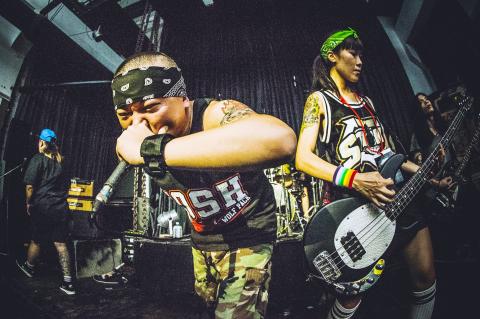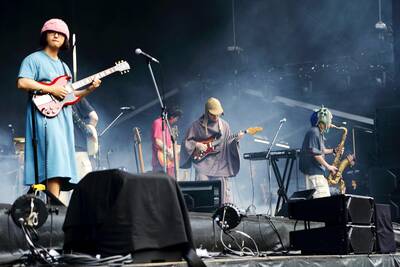Trying to come up in a fickle and at times indifferent musical climate is hard at the best of times. The independent music scene in Taipei is young, still finding its feet and largely struggling to define itself. Like a twenty-something stay-at-home overgrown adolescent, it lashes out and inward at itself in the fight for identity, oftentimes licking self-inflicted wounds. A few people within the scene are doubly subjected to these agonizing growing pains, functioning both as promoters and performers. Through tired eyes they watch the scene take almost everything they have, mentally as well as financially. But sometimes, the scene manages to give something back.
Hsinchu City’s (新竹市) Mike Huang (黃祐鼎) is one of those intrepid few brave enough to wage battle from the vantage point of the artist and the check writer. Huang got into hardcore music in 2001 after seeing New York legends Biohazard play at Formoz Festival, and was a fan for 10 years before he decided to try to build up the local hardcore scene by bringing in bands from overseas through his own organization, the Taiwan Hardcore Front (台灣哈扣戰線). In the summer of 2011, he joined one of the few hardcore bands in the country, Human Brutality (人類暴行), as their second vocalist. Then, in December that same year, he brought over Dutch hardcore mainstays No Turning Back for his first show, and began the journey through the highs and lows of being a promoter, a job which basically entails begging people to give a damn. It was an uphill battle from the beginning — a war of education rather than attrition.
“The hardcore scenes in other countries, most of them are based on the local punk scene,” says Huang. “In Taiwan, our hardcore scene is based on the metal scene, especially metalcore. It’s very difficult to clarify the difference between hardcore and metalcore, and people also don’t know much about the subculture of hardcore music.”

Photo courtesy of Selfkil
Through shows by the likes of Providence, heavy hitters from Paris, and Melbourne, Australia’s Crowned Kings, the die-hards came out, the fence-sitters did what they do, the people who couldn’t tell the difference between hardcore and metalcore, let alone be bothered to figure it out for themselves, sat back and scratched their heads. Huang eventually found himself at a familiar crossroads where the bottom line and passion intersect and a choice has to be made. Understandably, he chose to take a step back and reflect for a while.
Fortunately the hardcore scene managed to give back to the man who gave so much to it in the interim. In 2012 he met current Human Brutality bassist Gina Chiu (丘安惠), a longtime friend of the band and herself a die-hard supporter of the metal and hardcore community, and a hardcore romance blossomed. Now, the two are recently married, and this weekend they’re throwing a party at Revolver to celebrate featuring several of their closest friends who also happen to people the handful of hardcore bands from around Taiwan. It should serve as a reinvigorating experience for Huang, who is looking forward to getting the Taiwan Hardcore Front back in action as soon as May of this year. Hardcore taketh away, and hardcore giveth.
■ The MG Wedding Party takes place tomorrow night at Revolver, 1-2 Roosevelt Road Sec 1, Taipei City (台北市羅斯福路一段1-2號). Bands on the bill include Human Brutality, Silent Clamor (寂嘩), The Deposers (罷黜者) and Defeat the Giant. Admission is free, and the bands get going at 7pm.
If you’re curious as to why the metal world is saturated with sound-alike deathcore bands, head out to The Wall (這牆) on Thursday night to catch Riverside, California’s Suicide Silence in action. The band was formed in 2002 and helped usher in the dubious fusion of death metal and hardcore, now as much beloved by its neck tattoo favoring supporters as it is maligned by its humorless death metal purist detractors. The popularity of deathcore exploded in Taiwan starting around the mid-oughts, and has continued unabated to this day despite its repetitious nature and the fact that nearly every song within the narrow genre diaspora seems to build toward the same open-string chugging breakdown designed specifically so kids can throw karate kicks in the mosh pit. End obligatory rant from aforementioned jaded purist.
Suicide Silence released three full-length albums and toured the world several times over before being dealt a cruel blow in the form of the death of front man Mitch Lucker, who passed away due to injuries sustained in a motorcycle accident on Halloween night in 2012. The 28-year-old showman, whose wife claimed he drove drunk the night he died, also left behind a young daughter. Not long after he passed, the band staged a benefit show for Lucker’s daughter, then went quiet for a year, announcing the following October that Eddie Hermida of All Shall Perish had been brought in as the band’s new vocalist. Recently the band has been in the studio putting the finishing touches on a new album due out later this year, and is now out on the road for the first time with Hermida at the helm. Whether you like deathcore or not, Thursday promises to be a big night for the Taipei metal scene as Suicide Silence makes its first appearance in our nation’s capital.
■ Suicide Silence plays on Thursday at The Wall, B1, 200, Roosevelt Rd Sect 4, Taipei City (台北市羅斯福路四段200號B1). Opening acts are Emerging from the Cocoon (破繭而出) and Sideffect. Doors open at 6pm and the show gets underway at 7pm. Ticket prices range from NT$1,200 to NT$2,600.

No one saw it coming. Everyone — including the Chinese Nationalist Party (KMT) — expected at least some of the recall campaigns against 24 of its lawmakers and Hsinchu Mayor Ann Kao (高虹安) to succeed. Underground gamblers reportedly expected between five and eight lawmakers to lose their jobs. All of this analysis made sense, but contained a fatal flaw. The record of the recall campaigns, the collapse of the KMT-led recalls, and polling data all pointed to enthusiastic high turnout in support of the recall campaigns, and that those against the recalls were unenthusiastic and far less likely to vote. That

Behind a car repair business on a nondescript Thai street are the cherished pets of a rising TikTok animal influencer: two lions and a 200-kilogram lion-tiger hybrid called “Big George.” Lion ownership is legal in Thailand, and Tharnuwarht Plengkemratch is an enthusiastic advocate, posting updates on his feline companions to nearly three million followers. “They’re playful and affectionate, just like dogs or cats,” he said from inside their cage complex at his home in the northern city of Chiang Mai. Thailand’s captive lion population has exploded in recent years, with nearly 500 registered in zoos, breeding farms, petting cafes and homes. Experts warn the

A couple of weeks ago the parties aligned with the People’s Republic of China (PRC), the Chinese Nationalist Party (KMT) and the Taiwan People’s Party (TPP), voted in the legislature to eliminate the subsidy that enables Taiwan Power Co (Taipower) to keep up with its burgeoning debt, and instead pay for universal cash handouts worth NT$10,000. The subsidy would have been NT$100 billion, while the cash handout had a budget of NT$235 billion. The bill mandates that the cash payments must be completed by Oct. 31 of this year. The changes were part of the overall NT$545 billion budget approved

Before performing last Friday at Asia’s bellwether music festival, Fuji Rock in Japan, the Taiwanese indie band Sunset Rollercoaster (落日飛車) had previously performed on one of the festival’s smaller stages and also at Coachella, the biggest brand name in US music festivals. But this set on Fuji Rock’s main stage was a true raising of the bar. On a brilliant summer’s evening, with the sun rays streaming down over a backdrop of green mountains and fluffy white clouds, the performance saw the Taiwanese groovemasters team up with South Korean group Hyukoh, with whom they’ve formed a temporary supergroup called AAA